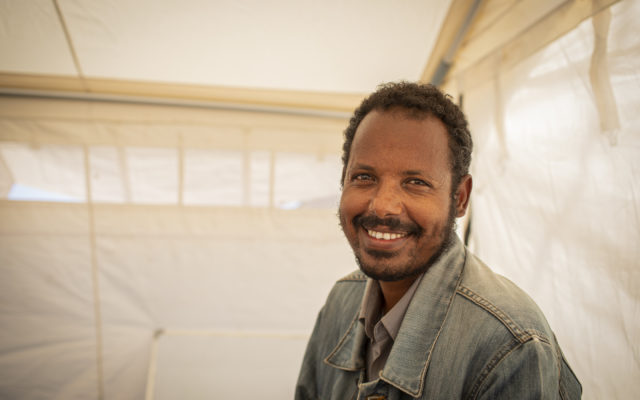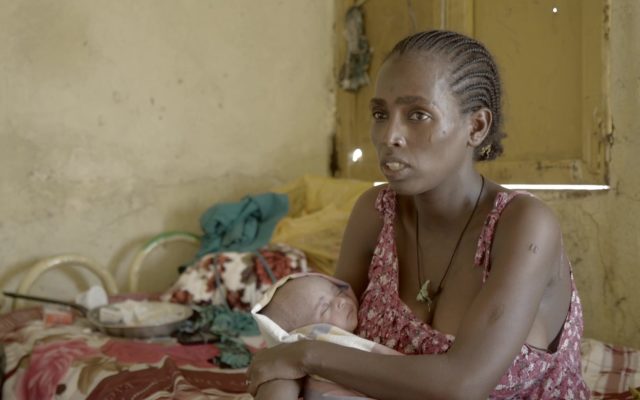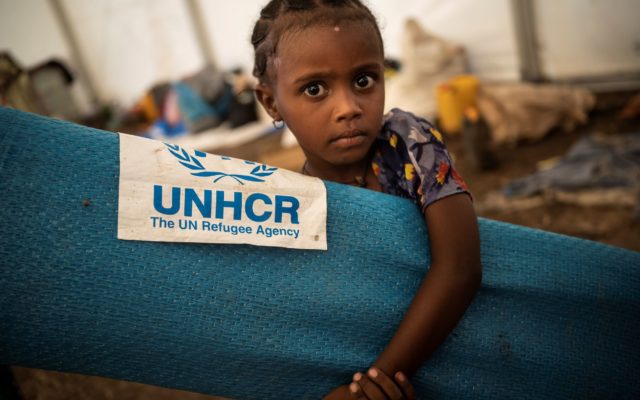‘There have been nights when we had nothing at all to eat.’
A widowed mother-of-four struggling to take care of her family in a camp is among the 287,000+ Afghans displaced since the start of the year by the latest upsurge in fighting.
© UNHCR / Edris Lutfi
Two weeks after fleeing her home to escape clashes between the government and opposition forces, 24-year-old Maryam* huddles in the shade of a makeshift shelter in Nawabad Farabi-ha camp on the outskirts of Mazar-e Sharif city in northern Afghanistan, seeking shade in the 45 degree heat.
She came here from the Sholgara district some 55 kilometres to the south with her four children, parents and brother, after opposition forces stormed the area and engaged in running battles with government forces. Maryam said she heard gunfire breaking out all around their home as the two sides fought for control of the area.
“We had no time to gather anything. We fled with only a blanket,” she said, sitting in a tent made from cloth tied to sticks used as anchor points. Though plastic tents are available, the stifling heat renders them unusable, so camp residents rely on the most basic materials to protect themselves from the fierce sun and frequent dust storms.
Maryam and her family are among an estimated 287,000 Afghans who have been newly displaced inside the country since the start of this year by an upsurge in violence.
“There have been nights when we had nothing at all to eat.”
Maryam and thousands of newly displaced Afghans are desperately trying to survive in harsh conditions. https://t.co/3fL9j6HsTU
— UNHCR, the UN Refugee Agency (@Refugees) July 24, 2021
Since UNHCR first warned of a looming humanitarian crisis in Afghanistan in July, the situation across the country has continued to grow more desperate. To make matters worse, a new wave of COVID-19, along with a severe drought, have exponentially increased the needs of those having to flee suddenly with just the clothes on their backs.
Since the 1st January this year, over 287,000 people have been internally displaced due to armed conflict. The updated total figure of Afghan refugees amounts to more than 2.6 million worldwide and constitutes one of the largest, most drawn-out situations under UNHCR’s mandate.
An emergency on top of an emergency, COVID-19 has had severe socioeconomic outcomes for internally displaced people in Afghanistan, resulting in higher levels of debt and food insecurity. Tragically, this has also led to increased rates of domestic violence, child labour, early or forced marriage and migration.
Families like Maryam’s need us now more than ever. Internally displaced families are in desperate need of core relief items like food, shelter, water, medication and cash for rent. Most displaced families in Afghanistan also lack basic essentials including water, food, clothing and live in inadequate shelters.
*Names changed for protection purposes.
This is an abridged version of the following article via UNHCR.
As the fighting in Afghanistan spreads, thousands more families are fleeing for their lives. You can help send a lifeline. Please donate today.




